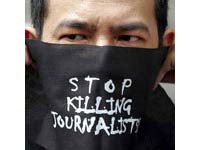UNESCO Director-General deplores the death of British journalist Rupert Hamer in Afghanistan
Paris, 19 January

Irina Bokova, the Director-General of UNESCO, today expressed sorrow at the death of British journalist Rupert Hamer, who was killed on 9 January in the explosion of a roadside bomb when travelling with a U.S. Marine Corps unit in southwestern Afghanistan.
“I am deeply saddened to hear of the death of Rupert Hamer,” said Ms Bokova. “Rupert Hamer was a dedicated journalist who was killed in the line of duty. His death highlights the great risks that journalists take when reporting on areas of conflict. I call on the Afghan authorities and all those responsible for security to increase their efforts to improve safety conditions and thus lessen the dangers journalists face.”
Rupert Hamer, the defence correspondent of the British daily Sunday Mirror, died at the scene of the explosion, north-west of Nawa in Helmand Province.
His colleague, photographer Philip Coburn, was seriously injured in the blast, which also killed two soldiers. The journalists were accompanying a Marine patrol when the bomb hit their vehicle.
Ten days earlier, Michelle Lang, a reporter from the Calgary Herald, was killed in similar circumstances when travelling with the Canadian military. According to Reporters Without Borders, a total of 12 foreign and eight Afghan journalists have been killed in Afghanistan since 2001.
UNESCO is the only United Nations agency with a mandate to defend freedom of expression and press freedom. Article 1 of its Constitution requires the Organization to “further universal respect for justice, for the rule of law and for the human rights and fundamental freedoms which are affirmed for the peoples of the world, without distinction of race, sex, language or religion, by the Charter of the United Nations.” To realize this the Organization is requested to “collaborate in the work of advancing the mutual knowledge and understanding of peoples, through all means of mass communication and to that end recommend such international agreements as may be necessary to promote the free flow of ideas by word and image…”
- Author(s):Press Release N°2010-06
- Source:UNESCOPRESS
- 19-01-2010

